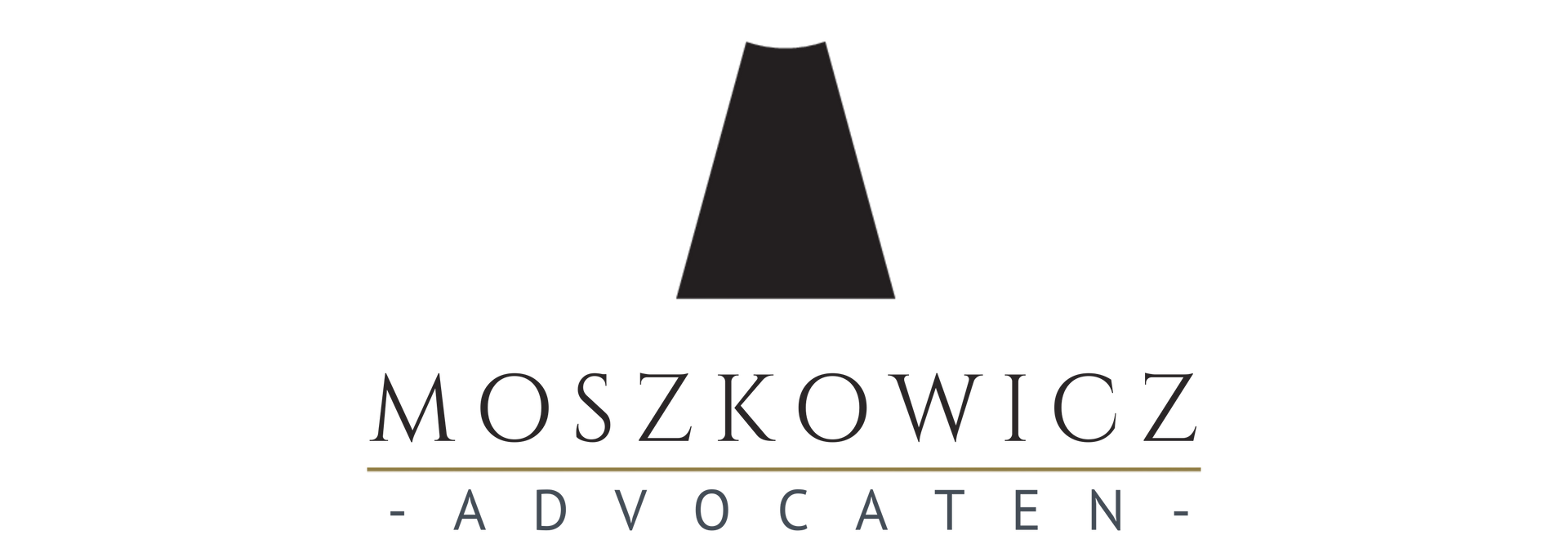GENERAL TERMS AND CONDITIONS
General
1. The Contractor is at all times Law Firm Mr. Yehudi Moszkowicz BV. The Client is the (legal) entity that instructs the Contractor to handle his/her affairs. An assignment is only concluded after it has been accepted by the Contractor. The present General Terms and Conditions apply exclusively to the agreement concluded between the Contractor and the Client. The applicability of Articles 7:404 and 7:407 paragraph 2 of the Dutch Civil Code is expressly excluded. 2. The Contractor shall never accept liability if and as long as the Client fails to fulfill, does not fully fulfill, or does not properly fulfill his/her obligations under these General Terms and Conditions and/or under the agreement and/or under the law. 3. If, during the performance of an assignment by the Contractor, an event unexpectedly occurs that leads to liability, that liability shall apply exclusively to the Contractor with whom the agreement was entered into and shall never also apply to the other entities referred to in Article 1.
Furthermore, liability is limited to the amount or amounts covered by the professional liability insurance taken out by the relevant contractor, plus the deductible. An event as referred to in the previous sentence also includes an omission.4. If the performance of an assignment from a client entails engaging a third party to perform work in connection with the given assignment, the relevant contractor will not be liable for any errors or other shortcomings of that person. Performance of the work5. In principle, the Lawyer who accepts the assignment will perform the work personally, with the understanding that the client is aware and agrees that another lawyer or legal assistant may draft the correspondence and procedural documents in the client's case. The client is aware and agrees that, if the contractor's practice so requires, the contractor's lawyers may represent each other in cases, for example, but not limited to, witness hearings, chamber hearings, and pleadings. The interests of the client are paramount in the performance of the work. The Attorney shall act in accordance with the regulations applicable to it, such as the Code of Conduct for Attorneys and the regulations and guidelines of the Netherlands Bar Association.6. When engaging third parties, the Attorney shall, as far as possible, consult in advance with the Client or its authorized representatives for whose benefit the third parties are engaged. The Attorney shall not be liable for any shortcomings of any nature whatsoever of these third parties and shall be entitled, without prior consultation and also on behalf of the Client, to accept any limitation of liability on the part of the third parties engaged by it.7. The Attorney shall commence his work after payment of an invoiced advance payment. In cases handled on the basis of legal aid, the Attorney shall only commence his work after payment of a personal contribution imposed by the RvR. During an ongoing assignment, the Attorney shall have the right to suspend the performance of his work as long as the Client is in default of meeting its payment obligations to the Attorney. Duty to Provide Information8. The Client is obliged to provide the Lawyer with all information, complete and truthful, that the Lawyer needs to properly perform its work for the Client, and to provide all information requested by the Lawyer, at least in a timely manner, upon first request. The Client is entitled to terminate the assignment immediately and without refund of invoices already paid if the Client, after being reminded to do so, does not provide the Client with the required information. Financial agreements9. The private Client declares to have been informed of his/her possible right to legal aid and, unless otherwise provided in the agreement of assignment, explicitly waives this right.10. If, despite the previous paragraph, it has been agreed that legal aid is a possibility, the Client is obliged to inform the Lawyer in a timely manner of his/her financial situation and any changes therein in connection with the possibility of applying for legal aid.11. If legal aid is granted, the Lawyer's fee will be paid by the Legal Aid Board, but the Client must pay a personal contribution to the Lawyer. The amount of this contribution is determined by the Legal Aid Board in accordance with the criteria applicable to and at the Board.12. If the Legal Aid Board withdraws or amends a previously granted legal aid, the Client will be considered a 'paying client'. By signing the agreement, the Client expressly declares that they are aware of this and accept it. Additional costs13. The Client (with or without legal aid) is obligated to pay the Additional costs themselves. These will not be advanced by the contractor; however, they will only be paid to the relevant agency after these costs have been invoiced to the client as an advance payment and settled by the client. Additional costs include, but are not limited to: court fees (not subject to VAT), bailiff costs, and any costs associated with hearing witnesses and experts. Regarding court fees, the client declares that they have been informed that in the event of non-payment (on time), their case may be declared inadmissible by the court and that they bear full responsibility for this. The Contractor is not liable for damages suffered by the Client and/or third parties as a result of non-payment (or late payment) of court fees.14. Additional Costs also include awards of legal costs. If a case is lost, the Client will be ordered by the court to pay the legal costs. These are the costs incurred by the opposing party for court fees and legal assistance. The Court determines the amount of the award of legal costs. This is difficult to estimate in advance.15. If, during or after the case, other costs are charged to the Lawyer that have not yet been paid by the Client, the Client is also obligated to reimburse these costs to the Contractor. Payment, advances16. The Client must pay the invoice for the fee (based on the agreed hourly rate plus 8% office costs and VAT) or the Personal Contribution, plus disbursements, office costs and sales tax, immediately after invoicing, unless the Lawyer has indicated in writing that a different payment term applies.17. If the payment term is exceeded, the Client will be in default by operation of law and will owe default interest equal to the statutory interest applicable at the time of the delay in the case of a private Client and the statutory commercial interest in the case of a business Client.18. The Lawyer is entitled to charge advances for both the fee and the Personal Contribution, as well as for the aforementioned Additional Costs. Advances charged and paid will be settled with the final settlement of the relevant assignment.19. If the Client fails to pay and/or fails to pay on time, the Lawyer is entitled to suspend its work and to invoke its right of retention, whereby the code of conduct for lawyers will be observed.20. If the Lawyer must take collection measures against a Client who is in default, the Client is obliged to pay the costs of out-of-court collection.21. The Client waives the right to invoke suspension or offsetting.22. If the costs of legal assistance (for example in IP matters) can be recovered from third parties, work will not be done on the basis of any legal aid granted, but the Client will reimburse the work performed and costs incurred by the Lawyer as a “paying client”, as stated below. Liability23. The Lawyer’s liability for any professional errors is limited to the amount paid in the relevant case by the Lawyer’s professional liability insurer. If for any reason no payment is made under the aforementioned insurance, any liability is limited to the total fee charged by the Attorney in the relevant case in the relevant year, excluding disbursements and VAT, up to a maximum of €15,000.24. The client indemnifies the contractor against all third-party claims, including any costs incurred by the contractor in connection therewith, that are in any way related to the work performed for the client. Intellectual Property25. Unless otherwise agreed in writing, the Attorney owns and retains the intellectual (property) rights to all her work, including letters, procedural documents, opinions, notes, articles and all drafts thereof. Third-Party Funds26. Moszkowicz Advocaten does not have a third-party funds account. Complaints27. The Client has an internal complaints procedure. The complaints procedure is available for inspection at the office and describes the internal complaints procedure. This procedure means that the Client must first make his/her complaints known to the Attorney.28. Other disputes shall be settled exclusively by the competent court in The Hague. The legal relationship between the Lawyer and the client is governed by Dutch law. Termination of the assignment29. If the Client fails to fulfill or fails to properly fulfill his/her obligations towards the Lawyer or third parties engaged by the Lawyer, the Lawyer shall have the right to terminate the agreement concluded with the Client with immediate effect by means of a registered letter.30. The Client shall be entitled to terminate this agreement at any time. Termination must be made by registered letter. The Lawyer shall invoice for the work performed up to the moment of termination. This also includes work performed by third parties, such as bailiffs, and so on. Miscellaneous31. All rights of action that the Client may invoke against the Lawyer shall in any case expire one year after the moment at which the Client became aware or could reasonably have been aware of the existence of these rights.32. The Lawyer shall have the right to amend these general terms and conditions. In such a case, the Client will be sent the amended general terms and conditions with a request to accept them within a certain period, failing which he/she will be deemed to have accepted them.33. These general terms and conditions also apply to additional orders and follow-up orders from the Client.
Moszkowicz attorneys, 2025















